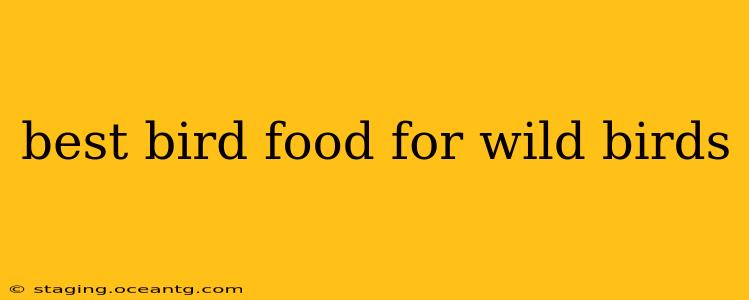Attracting a vibrant array of feathered friends to your backyard is a rewarding experience. But providing the right food is crucial for their health and survival. Choosing the best bird food isn't just about what they'll eat; it's about offering a nutritious and balanced diet that supports their natural behaviors and overall well-being. This comprehensive guide will explore the best options, addressing common concerns and helping you create a bird-friendly haven.
What's the Best Type of Birdseed?
The "best" birdseed depends on the species you want to attract. There's no one-size-fits-all solution. However, a good starting point is a high-quality blend containing a variety of seeds. These blends often include:
- Sunflower seeds (black oil): A favorite among many birds, these are rich in oil and energy. They're easy to crack open, even for smaller birds.
- Nyjer (thistle) seeds: These tiny seeds are particularly attractive to finches and goldfinches. Offer them in specialized feeders to prevent spillage.
- White-striped sunflower seeds: Larger than black oil sunflowers, these offer a good source of energy and attract a wider variety of birds.
- Milo (sorghum): A hardy grain that’s enjoyed by doves, sparrows, and other ground-feeding birds.
Avoid mixes that are heavily laden with fillers like wheat or cracked corn, which many birds find less appealing and less nutritious.
What Other Foods Can I Offer Wild Birds?
Beyond birdseed, supplementing with other foods can attract a greater diversity of birds and provide them with essential nutrients. Consider these options:
- Suet: A high-energy food made from rendered beef fat, suet is a valuable energy source, especially during cold weather. It can be purchased alone or with added nuts, seeds, and fruits.
- Nuts: Unsalted peanuts (in the shell or shelled), walnuts, and pecans are all excellent additions, providing protein and healthy fats.
- Fruits: Apples, oranges, berries, and melons (cut into small pieces) offer a refreshing and nutritious treat.
- Mealworms: Live or dried mealworms are a great source of protein, particularly appealing to insect-eating birds like robins and bluebirds.
Important Note: Always avoid offering bread, processed foods, or anything containing salt, chocolate, or caffeine. These can be harmful to birds.
What is the Best Bird Feeder for Wild Birds?
The type of feeder you use can significantly impact which birds you attract. Different feeders are designed to accommodate different feeding styles and seed types:
- Tube feeders: Ideal for smaller birds that can perch and feed from individual ports. They're best for sunflower seeds and nyjer seeds.
- Hopper feeders: Offer larger quantities of seed and are suitable for a range of bird species.
- Platform feeders: Designed for ground-feeding birds like doves and juncos.
- Suet feeders: Specifically designed to hold suet cakes or balls securely.
What Should I Never Feed Wild Birds?
It's equally important to know what not to feed wild birds. Foods like bread, milk, and anything containing salt, chocolate, or caffeine can be detrimental to their health. These foods lack nutritional value and can even be toxic. Always prioritize providing wholesome and natural foods.
How Often Should I Refill Bird Feeders?
Regularly check your feeders and refill them as needed. This ensures a consistent food supply and prevents birds from going hungry. The frequency depends on the number of birds visiting your feeders and the size of the feeders themselves. Aim to refill them at least once or twice a week, or more often during periods of harsh weather or when they're frequently depleted.
What are the Best Bird Feeders for Specific Bird Species?
Different bird species have different preferences. Some are ground feeders, others prefer to perch, and some are specialized in accessing particular types of feeders. Selecting the right type of feeder maximizes the chances of attracting your desired bird species. Research the birds common to your area to identify their preferred feeding habits and choose a feeder accordingly. For example, finches thrive on specialized nyjer feeders, while ground-feeding birds benefit from platform feeders.
Are there any health concerns to consider when feeding wild birds?
While providing food is generally beneficial, it's important to be mindful of potential health concerns. Keep feeders clean and regularly disinfect them to prevent the spread of disease. Also, monitor for signs of illness among visiting birds and contact a wildlife rehabilitator if necessary. Avoid overfeeding, as it can lead to obesity and other health issues.
By carefully considering the best bird food for wild birds and employing responsible feeding practices, you can create a thriving avian community in your backyard, providing enjoyment for yourself and enriching the lives of these wonderful creatures.
